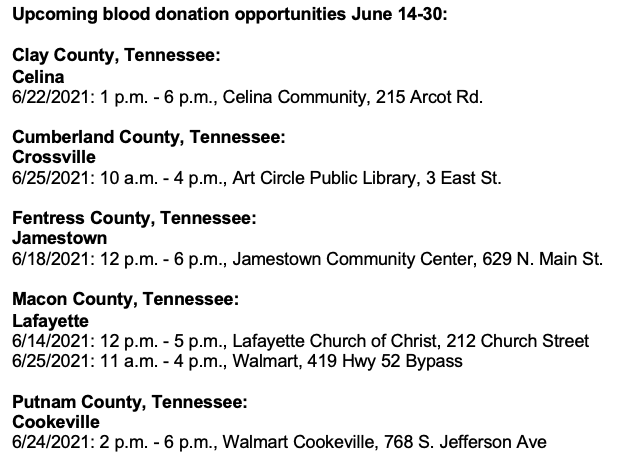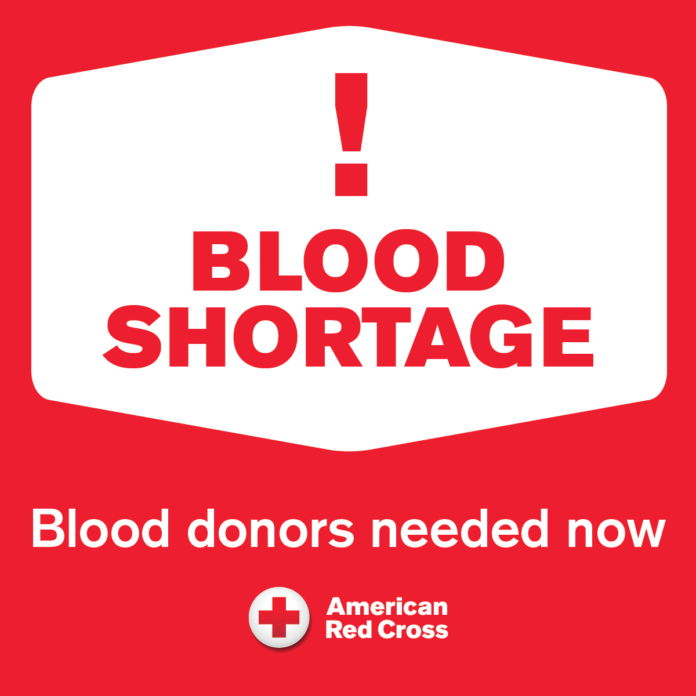Don
New effects of pandemic leading to significant drop in nation’s blood supply
NASHVILLE — The American Red Cross is experiencing a severe blood shortage as the number of trauma cases, organ transplants and elective surgeries rise – and deplete the nation’s blood inventory. Donors of all blood types – especially type O and those giving platelets – are urged to make an appointment to give as soon as possible to prevent further impact to patients.
Right now, hospitals are responding to an atypically high number of traumas and emergency room visits, as well as overdoses and resulting transplants. In comparison to 2019, the Red Cross has seen demand from trauma centers climb by 10% in 2021− more than five times the growth of other facilities that provide blood transfusions.
“When seconds count in emergency trauma situations, it’s the blood already on the shelves that can make the difference in lifesaving care,” said Garry Allison, Regional Donor Services Director, of Red Cross Tennessee Region. “As many people begin to enjoy travel and time with loved ones again this summer, patients are relying on the generosity of donors to help ensure they have access to the treatment they need. Please consider blood donation as a summer activity that can help save lives.”
Patients need the help of the American people. Schedule an appointment to give blood now by using the Red Cross Blood Donor App, visiting RedCrossBlood.org, calling 1-800-RED CROSS (1-800-733-2767) or enabling the Blood Donor Skill on any Alexa Echo device.
In addition to trauma needs, there is a great hospital demand for blood as people who deferred care during the height of the pandemic present with more advanced disease progression, requiring increased blood transfusions. Over the last three months, the Red Cross has distributed about 75,000 more blood products than expected to meet these needs. As a result of this shortage, some hospitals are being forced to slow the pace of elective surgeries until the blood supply stabilizes. Blood is perishable and cannot be stockpiled, so it must constantly be replenished by generous blood donors.
Donors are urged to make an appointment to give blood or platelets now. As a thank-you, those who come to give now through June 30 will receive a $5 Amazon.com Gift Card via email, courtesy of Amazon. (Restrictions apply. Additional information and details are available at RedCrossBlood.org/Together.)
In most cases, those who have received a COVID-19 vaccine can donate. However, knowing the name of the manufacturer of the vaccine they received is important in determining donation eligibility.
Final weeks for COVID-19 antibody testing
As more than a third of Americans have become fully vaccinated against COVID-19, the Red Cross is winding down COVID-19 antibody testing for blood, platelet and plasma donations.
Through June 25, the Red Cross is testing all donations for COVID-19 antibodies. Testing may show possible exposure to the virus or whether a donor has developed an immune response to vaccination. The conclusion of Red Cross antibody testing represents a new, hopeful phase as the nation continues to journey out of this pandemic.
World Sickle Cell Day: June 19
June 19 is World Sickle Cell Day, an important day for the more than 100,000 individuals with sickle cell disease in the U.S. Most people with this disease are of African descent and will require regular blood transfusions to help manage their disease. Some individuals with sickle cell disease may require as many as 100 units of blood per year.
The Red Cross is screening all blood, platelet and plasma donations from self-identified African American donors for the sickle cell trait. This additional screening will provide Black donors with an additional health insight and help the Red Cross identify compatible blood types more quickly to help patients with sickle cell disease. Since the best blood match for a patient receiving ongoing transfusions comes from donors of the same genetic background, the Red Cross encourages people of all ethnicities to give blood and help increase the number of diverse donors so we can find the best match for all patients.
Donors can expect to receive antibody test and sickle cell trait screening results, if applicable, within one to two weeks through the Red Cross Blood Donor App and the online donor portal at RedCrossBlood.org.

Blood drive safety
The Red Cross has updated its pandemic safety protocols in alignment with the Centers for Disease Control and Prevention and Occupational Safety and Health Administration. Fully vaccinated individuals, including staff and donors, no longer need to wear masks or socially distance. Unvaccinated individuals continue to be required to wear masks and socially distance. Donors are asked to schedule an appointment prior to arriving at the drive.
Each Red Cross blood drive and donation center follows the highest standards of safety and infection control, and additional precautions – including social distancing and face masks for donors and staff – have been implemented to help protect the health of all those in attendance. Donors are asked to schedule an appointment prior to arriving at the drive and are required to wear a face mask while at the drive, in alignment with state guidance.
Don’t wait to give
Donors can also save up to 15 minutes at the blood drive by completing a RapidPass®. With RapidPass®, donors complete the pre-donation reading and health history questionnaire online, on the day of donation, from a mobile device or computer. To complete a RapidPass®, follow the instructions at RedCrossBlood.org/RapidPass or use the Red Cross Blood Donor App.
To donate blood, individuals need to bring a blood donor card or driver’s license or two other forms of identification that are required at check-in. Individuals who are 17 years of age in most states (16 with parental consent where allowed by state law), weigh at least 110 pounds and are in generally good health may be eligible to donate blood. High school students and other donors 18 years of age and younger also must meet certain height and weight requirements.
About the American Red Cross
The American Red Cross shelters, feeds and provides emotional support to victims of disasters; supplies about 40% of the nation’s blood; teaches skills that save lives; provides international humanitarian aid; and supports military members and their families. The Red Cross is a not-for-profit organization that depends on volunteers and the generosity of the American public to perform its mission. For more information, please visit redcross.org or cruzrojaamericana.org, or visit us on Twitter at @RedCross.









